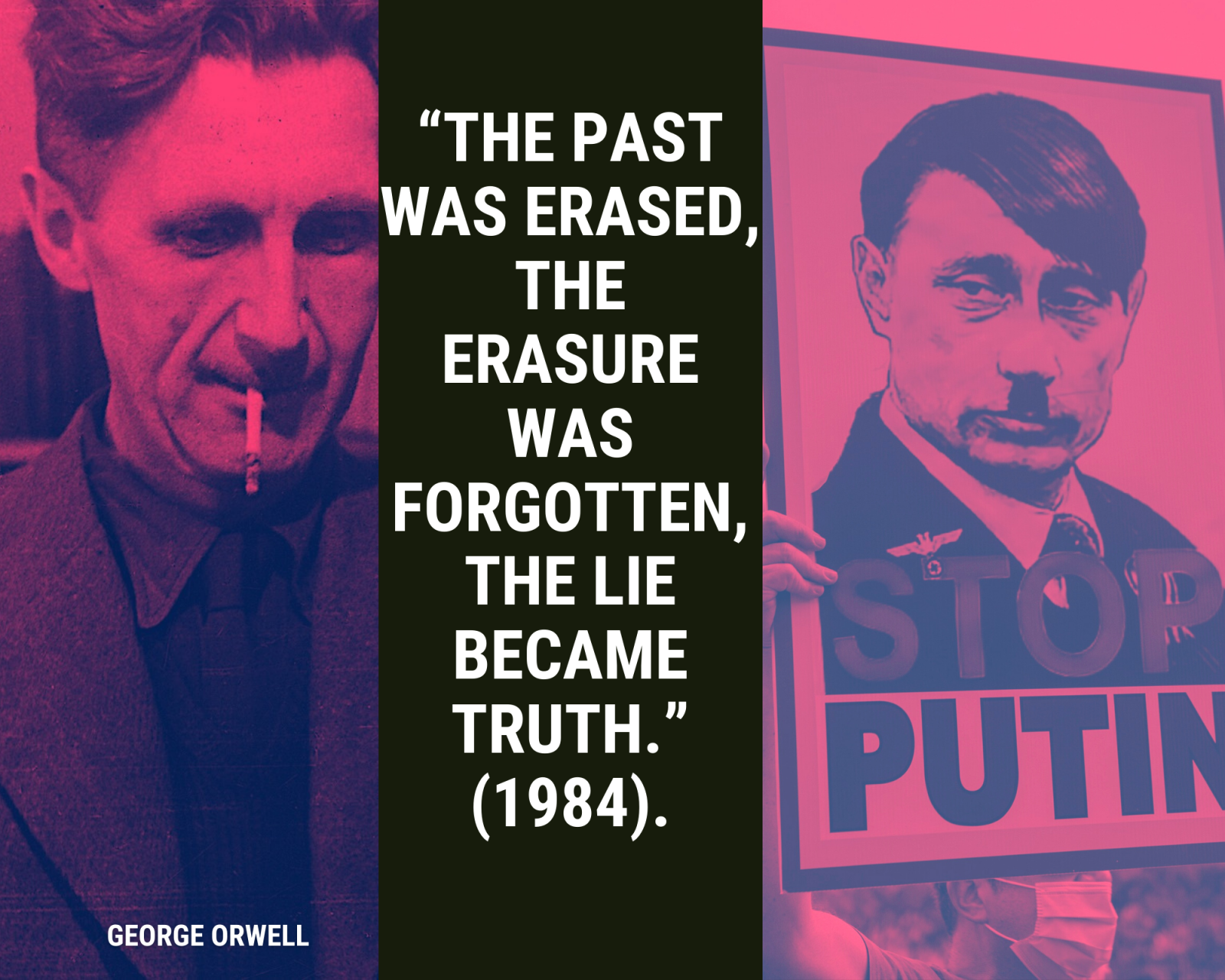You are cordially invited to the inaugural George Orwell Ukraine Study Tour

(Photo: Portrait of George Orwell from areomagazine.com) | Protest poster against Russian invasion of Ukraine in Pretoria by Alet Pretorius)
By Greg Rosenberg
DAILY MAVRICK, SA
13 Mar 2022 0
Study the contemporary masters as they put Orwell’s ideas on language and society into practice.
Dear friend,
You are cordially invited to join us for the inaugural George Orwell Ukraine Study Tour. Our newest offering provides a unique perspective on recent European events through the eyes of the author of Animal Farm and 1984. It builds on our wildly productive annual Orwell sojourns to Washington, DC, Beijing, London, Paris, Berlin and Brussels.
Given the current unpleasantness associated with the special military operation to defend the Donbass republics, the tour will circumvent Kyiv in favour of several other cities where participants can study the classics, along with an exciting new southern hemisphere destination: Pretoria!
This tour will explore several themes linked to Orwell’s writings on language and society through an in situ examination of the innovative work of contemporary masters.
Theme 1: “Political language … is designed to make lies sound truthful and murder respectable, and to give an appearance of solidity to pure wind.” (Politics and the English Language).
We start in picturesque Antalya, where Russian Foreign Minister Sergey Lavrov last week uttered these memorable words: “We have not invaded Ukraine. In Ukraine, we are simply… we have explained it many times”. He went on to state that all the fuss about Mariupol’s maternity hospital was “pathetic shouting”: the hospital was empty of patients and full of Ukrainian militants when Russia bombed it.
What can one say about a man at the peak of his powers, apart from noting that he maintained a straight face throughout?
Theme 2: “The past was erased, the erasure was forgotten, the lie became truth.” (1984).
What better place to observe the Russian masters than from the banks of the Volga?
Vladimir Putin’s 21 February address provides a unique insight into the mindset of the Russian president and the siloviki. It’s particularly notable for its brazen rewriting of history, as in: “Since time immemorial, the people living in the south-west of what has historically been Russian land have called themselves Russians and Orthodox Christians.”
With this one sentence, Putin manages to echo the tsars, promote his own imperial ambition and erase Ukraine’s sovereignty. Would it be churlish to note that since at least the 9th century, millions of Ukrainian Jews never did quite consider themselves Orthodox Christians? Discuss.
In cross-fertilisation with Theme 1, we will also explore Putin’s artful claim that Moscow is out to “demilitarise and denazify Ukraine”.
Contrast this with Ukrainian President Volodymyr Zelensky’s remarks from central Kyiv, where he stated, “We are all here. Our soldiers are here. The citizens are here, and we are here. We defend our independence. That’s how it’ll go.” Zelensky, who is Jewish, clearly has no appreciation for the Orwellian lexicon.
Special offer for Moscow: Sign up by 15 March and receive a tour-branded wheelbarrow, which can be used to transport large quantities of rubles to purchase teas, light meals, and sumptuous dinners at recommended restaurants!
Theme 3: “War is peace. Freedom is slavery. Ignorance is strength.” (1984).
A merry romp through the offices of the Russian media establishment. With caviar and vodka!
Theme 4: “Political language has to consist largely of euphemism, question-begging and sheer cloudy vagueness.” (Politics and the English Language).
Take a break from cold, grey Europe to enjoy the sunny skies of South Africa.
In his 7 March missive on “the conflict” between Russia and Ukraine, South African President Cyril Ramaphosa declared that “South Africa is firmly on the side of peace”. As you pause to catch your breath, consider how this statement reaffirms the popular view in domestic policy circles that South Africa “punches above its weight”.
The president followed this stirring clarion call with an explanation: “South Africa abstained from voting in last week’s United Nations resolution on the escalating conflict between Russia and its neighbour Ukraine because the resolution did not foreground the call for meaningful engagement.” A few days later, Ramaphosa tweeted that he was “thanking His Excellency President Vladimir Putin for taking my call … so I could gain an understanding of the situation that was unfolding between Russia and Ukraine”.
Notice how the word “invasion” does not appear even once. Understated, but powerful! In short, South Africa offers the opportunity for a masterclass in euphemism, homily and platitude. During regular power cuts, the president’s inspirational words can light up your day.
Theme 5: “Intellectual honesty is a crime in any totalitarian country; but even in England it is not exactly profitable to speak and write the truth.” (Orwell on Truth).
How true – but it is profitable to launder money for Russian billionaires! Enjoy a jolly afternoon with drinks on the banks of the Thames. Meet with cash-flush law firms, PR agencies and estate agents who help keep the wheels of this industry turning.
Special offer – act now!: Orwell fans will recall that 1984 was set in London. Sign up by 15 March and get a T-shirt emblazoned with this brilliant quote from the novel: “It’s a beautiful thing, the destruction of words.”
Slightly off-topic, but still in the region, the tour concludes with a flyover of Snake Island, whose border guards provided the world with a vivid and memorable lesson in the honest, exclamatory sentence. DM
Greg Rosenberg is the co-author of Become a Better Writer: How to Write with Clarity and Simplicity (Clarity Global).
No comments:
Post a Comment